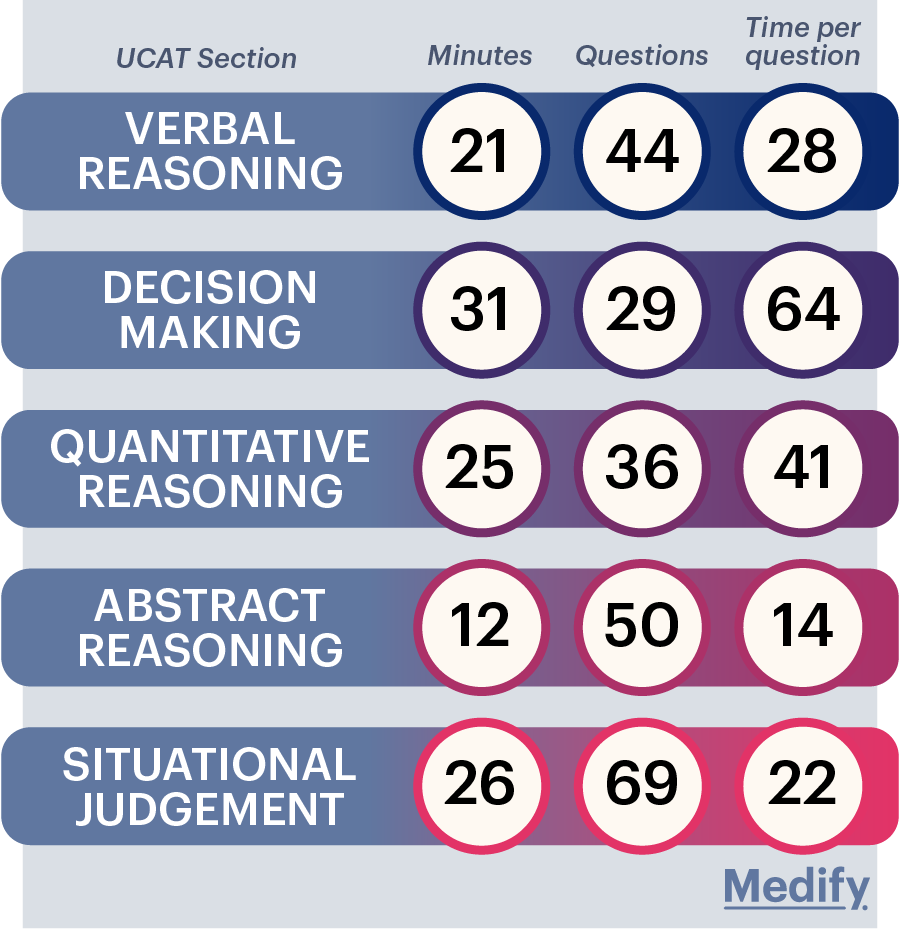
The UCAT (University Clinical Aptitude Test) is a pivotal exam for students aspiring to enter medical and dental schools in the UK, Australia, and New Zealand. This comprehensive guide will cover everything you need about the UCAT exam, including exam dates, eligibility, registration processes, syllabus, exam structure, scoring system, and preparation tips.
Syllabus for UCAT Exam
The UCAT syllabus 2024 is designed to assess the mental skills needed for success in medical and dental schools. The test is divided into five sections: Verbal Reasoning, Decision Making, Quantitative Reasoning, Abstract Reasoning, and Situational Judgement, which focuses on non-cognitive skills. Each version of the test is randomly generated from a large pool of questions, ensuring that the difficulty level is consistent. Below is a breakdown of the number of questions in each section and the time given to complete them, specifically for Indian students preparing for the UCAT.
| UCAT Sections | Number of Questions | Time Alloted |
| Verbal reasoning | 44 | 21 minutes |
| Decision making | 29 | 31 minutes |
| Quantitative reasoning | 36 | 25 minutes |
| Abstract reasoning | 50 | 12 minutes |
| Situational judgment | 66 | 26 minutes |
UCAT Exam Dates
UCAT exam registration typically opens in late May or early June. The exams are conducted on various dates from July to September, with results expected by early November. It’s a good idea to take the test as early as possible. If you’re planning to sit for the UCAT exam date in 2024, here are the important dates you need to know:
| Important Dates | Particulars |
| 24 May 2024 | Account registration starts |
| 20 June 2024 | Exam booking opens |
| 11 July 2024 | University Clinical Aptitude Test begins |
| 20 September 2024 | Deadline for access arrangement application |
| 22 September 2024 | Exam booking deadline |
| 29 September 2024 | Last date of examination |
| 30 September 2024 | Application deadline for bursary scheme |
| 15 October 2024 | UCAS deadline |
| Early November | UCAT results delivered to universities |
UCAT Exam Eligibility
To be eligible for the UCAT exam, candidates must meet certain criteria:
Completion of Year 12 or equivalent.
Current Year 12 students planning to apply for medical or dental courses.
Those taking a gap year can also register.
Postgraduate students with relevant degrees may also sit for the exam.
It’s advisable to register early as test slots can fill up quickly.
How to Apply for UCAT Exam Preparation?
Here’s a step-by-step process to apply for the UCAT exam:
Check Important Dates:
Find out the registration and testing dates for the UCAT exam.
Create an Account:
Once registration opens, create an account on the official UCAT portal and book your test.
Pay the Registration Fee:
The fee is £120 (approximately ₹11,370) and can be paid via debit or credit card.
Choose Your Test Details:
Select your preferred date, time, and test centre while booking.
Review Testing Rules:
Read the testing guidelines carefully and bring only the permitted items to the test centre.
Book Early:
Schedule your test as soon as possible to avoid missing out for the year.
Access Your Results:
You will receive your UCAT results before leaving the test centre, and the detailed report will be available online within 24 hours.
UCAT Exam Structure
The structure of the UCAT consists of five sections designed to evaluate different cognitive skills:
Verbal Reasoning:
Tests comprehension and logical reasoning with written passages.
Quantitative Reasoning:
Assesses numerical problem-solving abilities.
Abstract Reasoning:
Evaluates pattern recognition and logical thinking using shapes and diagrams.
Decision Making:
Measures critical thinking skills in complex scenarios.
Situational Judgment:
Assesses judgment and decision-making in professional contexts.
UCAT Exam Eligibility
If you’re planning to take the UCAT exam, it’s crucial to understand the eligibility requirements. Here are the key details:
Mandatory for Admission:
The UCAT is required for those applying for entry into medical or dental schools in the same academic year or for deferred entry in the following year.
Registration and Exam Dates:
Registration usually starts in early June, with exams held from late July to September. Always check the official UCAT website for specific dates.
Exam Options:
Depending on availability, candidates can choose to take the test either online or at an authorized test center.
Eligibility Groups:
– Year 12 students planning to pursue medicine or dentistry and complete their A-Levels or IB the next year.
– Students are taking a gap year before starting university.
– Postgraduates with strong academic backgrounds in related fields.
Preparation Timeline:
Start preparing for several months to ensure the best performance.
Importance of the UCAT:
A well-prepared UCAT attempt significantly enhances your chances of getting into your desired medical or dental program, paving the way for a successful healthcare career.
UCAT Exam Pattern
Understanding the UCAT exam structure and UCAT exam pattern is crucial for your preparation. The test has five sections:

Verbal Reasoning
– Tests your ability to understand and evaluate written information.
– Time: 21 minutes
– 44 questions
Decision Making
– Assesses your ability to make logical decisions and solve problems.
– Time: 31 minutes
– 29 questions
Quantitative Reasoning
– Focuses on numerical skills and data interpretation.
– Time: 24 minutes
– 36 questions
Abstract Reasoning
– Tests your ability to recognize patterns and think critically.
– Time: 13 minutes
– 55 questions
Situational Judgement
– Evaluates your understanding of professional behavior and ethics.
– Time: 26 minutes
UCAT Exam Scoring System
The UCAT exam scoring system evaluates your performance based solely on the number of correct answers, as there is no negative marking. Each question is independent, meaning your performance on one question doesn’t impact the others.
Cognitive Subtest Scoring
The four cognitive subtests—Verbal Reasoning, Decision Making, Quantitative Reasoning, and Abstract Reasoning—are scored on a scale from 300 to 900 each. This results in a total score range of 1200 to 3600 across all four sections.
Situational Judgement Scoring
The Situational Judgement Test (SJT) is scored differently. Marks are based on how closely your answers align with the correct responses. Final scores are categorized into bands, with Band 1 being the highest and reflecting excellent performance.
Marking Scheme for Cognitive Subtests
Here’s a breakdown of how each cognitive subtest is scored:
Verbal Reasoning: Each correct answer earns 1 mark.
Decision Making:
– Single-answer questions are worth 1 mark each.
– Multiple-statement questions are worth 2 marks. A partially correct response in these earns 1 mark.
Quantitative Reasoning: Each correct answer earns 1 mark.
Abstract Reasoning: Each correct answer earns 1 mark.
By understanding the scoring system and focusing on accuracy, you can maximize your UCAT score and improve your chances of admission into medical or dental schools.
UCAT Exam Fees
The UCAT (University Clinical Aptitude Test) exam fee for Indian students varies based on the testing location. As of 2024, the fee for Indian students taking the UCAT outside the UK is £140, which is approximately ₹14,000. This fee is paid during the online registration process, and it is crucial to register within the official testing window, which typically runs from July to October.
This fee applies whether you are taking the exam in India or any other international location outside the UK. For Indian students applying to universities in Australia or New Zealand, the UCAT ANZ (Australia and New Zealand) exam fee is around AU$305, translating to approximately ₹16,000. It’s important to note that fees may vary slightly due to fluctuations in exchange rates, so students should check the latest fee details on the official UCAT website before registering.
As of 2024, here are the UCAT exam fees for Indian students:
– UCAT Test Fee for India: Approximately INR 17,000 to INR 18,500 (around £195-£210).
– Late Registration Fees: Depending on how late you register, an additional charge of INR 2,000 to INR 3,000 may apply.
The exam fee includes registration and access to all UCAT test centres across India. During the registration process, payment is made online via the Pearson VUE system. Students should also know that fees can vary slightly due to currency exchange rates and additional processing charges.
Conclusion
The UCAT exam is a significant milestone for aspiring medical and dental students. By understanding its structure, preparing effectively, and diligently following the registration process, you can position yourself for success. Remember that while a good score on the UCAT coaching class can open doors to your desired program, it is just one part of your overall application package. Focus on developing a well-rounded profile with strong academic performance and relevant experiences in healthcare settings.
Points Edu Lab is a dedicated platform that provides comprehensive resources for students preparing for the UCAT (University Clinical Aptitude Test). This focuses on offering tailored guidance, study materials, and practice tests to help candidates enhance their performance on this crucial exam. By utilizing a structured approach to learning, Points Edu Lab aims to equip students with the necessary skills and knowledge to excel in the UCAT and secure their place in medical and dental schools.



